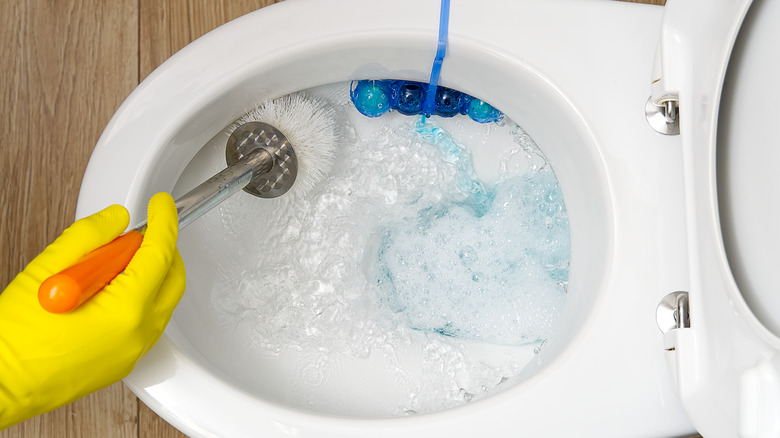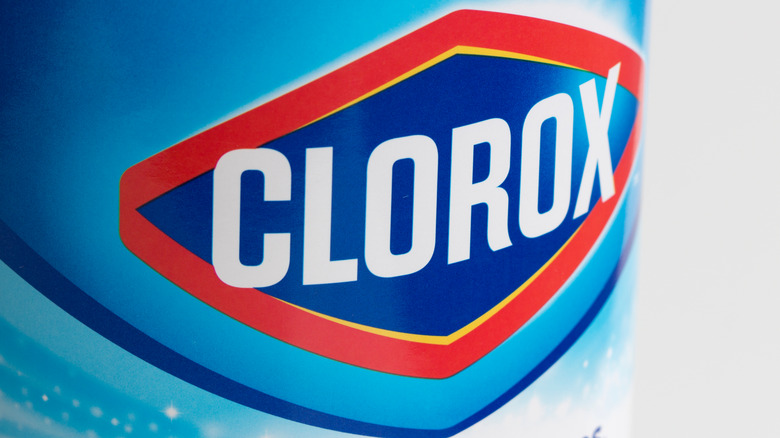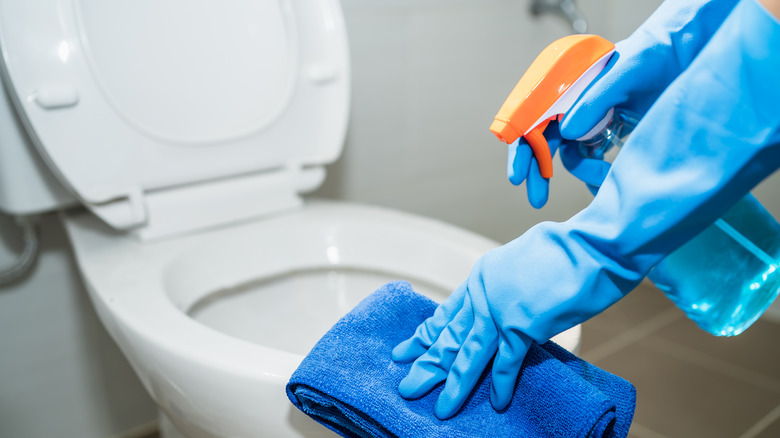How Much Bleach Should You Actually Use To Clean Your Toilet?
Are you over staring at those seemingly permanent rings circling the inside of your porcelain throne? Is your toilet a little bit stink-tastic and in need of a nice clean n' polish? Maid For You explains that those unsightly rings and cascading dribble stains in the bowl of your toilet are caused by one of two things: Hard water or water that has been sitting around for a while. Luckily, there's this little cleaning product called bleach, and it's designed to do more than just combat stains. This magical liquid not only cleanses and makes your commode shine brighter than the north star (maybe not that bright, but you get the idea), but it also kicks germs out the door.
When used properly, bleach is the ultimate tool for keeping your home pristine and germ-free. When used properly, this purification powerhouse kills bacteria and viruses on contact, which makes it an excellent choice for cleaning different areas of your home where these invisible organisms might land and flourish. Areas like your toilet.
Too much of a good thing
While it may be tempting to dump a whole bottle of bleach solution into the john, that's not really the way it works. There is such a thing as too much, and when it comes to bleach, a little goes a long way. According to the folks at Clorox, all you need is ⅓ of a cup of bleach and a toilet brush.
You'll first want to flush your toilet. This is to make sure there's no ammonia (AKA urine) left in the toilet, because ammonia and bleach do not mix. Once your toilet has refilled, measure out ⅓ cup of bleach and add it to your toilet, using your brush to clean as much as possible. Let it sit for up to 6 minutes for really tough stains. Flush the toilet again to rinse the bleach, and you should have a sparkling throne fit for royalty.
When dealing with harsh chemicals like bleach, always err on the side of caution. At a minimum, Online Safety Trainer states that you should wear long sleeves, rubber gloves, and a face mask. If you happen to have protective eyewear, like goggles, wear that. Bleach is an irritant, and if your skin is exposed to it or the fumes are inhaled, you can cause yourself some serious bodily damage, via Beyond Toxics.
Bleach isn't always the answer
Toilets are typically crafted from ceramic and-or porcelain, which makes them completely waterproof, writes the Plumbing & A/C Medic. This means that your throne is completely impervious to the somewhat corrosive qualities that bleach can have. That being said, there are a few specific types of porcelain that you should not use bleach on, as noted by Dakota Sinks. Regular bleach is suitable for cleaning white porcelain, but you should refrain from cleaning both colored and vintage porcelain (from 20 to 100 years old, per Sports N' Hobbies) with chlorine bleach because it can damage the finish.
If your toilet has rust stains, steer clear of using bleach because the sodium chloride in your bleach can (and will) speed up any oxidation that is already occurring. In other words, it will make your situation much more difficult than it needs to be, via Green Energy Mechanical Inc.


